American Car Spotters Guide - 1952 |
|
|
 |
|
|
|
In 1952 Studebaker celebrated their 100th anniversary, Cadillac and the AAA (American Automobile Association) their 50th, Willys produced their 1,100,000th utility-type vehicle, a civilian Universal Jeep, since they built their first military Jeep-just over 10 years earlier, Chevrolet produced their 1-millionth Powerglide automatic transmission, Charles E. Wilson, president of General Motors, was named Secretary of Defense in the Eisenhower Cabinet and Harlow H. Curtice succeeded him as GM president.
Many automotive firms were engaged in defence production, including aircraft engines (Buick, Kaiser-Frazer, Studebaker), tanks, guns and other munitions. In addition they sold 4,320,794 cars and almost 1 million trucks and buses. Powel Crosley retired as president-treasurer of Crosley Motors after General Tire and Rubber bought the company. Production of the little Crosley cars, first introduced in 1939, was discontinued in July. Henry Ford's Dearborn Motors Corp. settled suit with Henry Ferguson for 9½ million dollars, ending the Ford Dearborn-Ferguson tractor patents litigation. Many 1952 cars featured a one-piece windscreen. |
 |
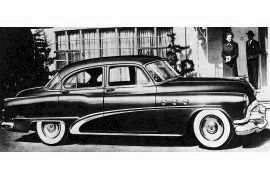 |
 |
Buick |
| |
Also see: Buick Car Reviews | The History of Buick |
| |
The 1952
Buick range did not differ much from the preceding model year. Again there were three series: 40 Special (6 models), 50 Super (5) and 70 Roadmaster (5). The latter had, as usual, four 'port-holes' as against three on the others. Pictured left is the Series 40 Special, Model 410, which had a 263 CID S-in-line engine and 121½ inch wheelbase. |
|
 |
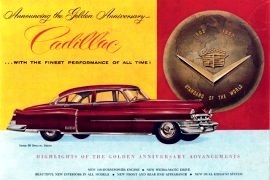 |
|
 |
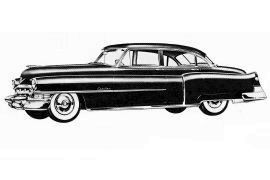 |
 |
Cadillac Series 62 |
| |
Also see: Cadillac Car Reviews | The History of Cadillac |
| |
The 1952 Cadillac Series 62 Sedan Model 6219 is pictured left. The Series 60 and 75 were also available as previously. The engine was an improved 190-bhp high-compression OHV V8 with four-barrel carburetor. The Hydra-Matic transmission (optional on Series 75, standard on others) now had three forward ranges viz: Drive. first position (01) for all four gear ratios, second (02) for up to third ratio. Low (L) for up to second ratio. A new power steering system was also introduced. |
|
 |
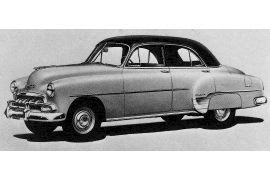 |
 |
Chevrolet |
| |
Also see: Chevrolet Car Reviews | The History of Chevrolet |
| |
1952 Chevrolet models were the last facelifted editions of the models which were introduced in 1949. Body style availability was much the same as in 1949 except that during 1950-51 the Bel Air Hardtop Coupe had been added and the fastback four-door Fleetline Sedans and the Station Wagon with wooden body had been dropped. |
|
 |
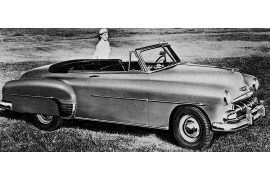 |
 |
Chevrolet Convertible |
| |
Also see: Chrysler Car Reviews | The History of Chrysler |
| |
Pictured left is a 1952 Chevrolet Series 2100KK Styleline DeLuxe Convertible model 2134. Convertibles with Powerglide transmission had 7·10-15 tires, instead of 6·70-15 as on all other Chev models. |
|
 |
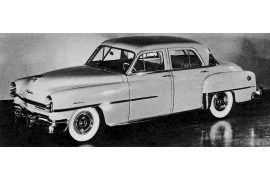 |
|
 |
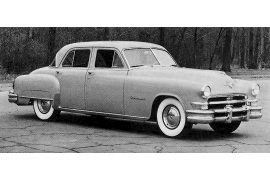 |
 |
Chrysler |
| |
Also see: Chrysler Car Reviews | The History of Chrysler |
| |
The Chrysler Imperial C-54 had the same wheelbase as the Chrysler New Yorker (131½-in). The C-53 Crown Imperial had the longer 145½-in wb chassis, as per previous Imperials, and was offered as 8-passenger Sedan and Limousine with PAS as standard equipment. Both series had the Chrysler 331·1 CID 180-bhp 'hemi-head' V8. |
|
 |
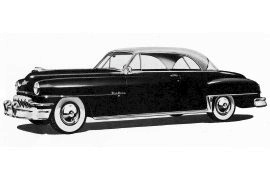 |
 |
DeSoto |
| |
Also see: The History of DeSoto |
| |
DeSoto DeLuxe S-15-1 and Custom S-15-2 were much the same as before. New in 1952 was the Firedome, Series S-17, which featured a 276,1 CID 160-bhp version of Chrysler's new 'hemi-head' V8 engine. Shown is the Firedome Hardtop Coupe. |
|
 |
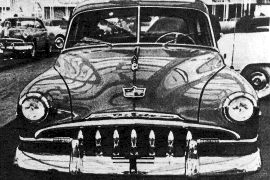 |
 |
DeSoto Diplomat |
| |
Also see: The History of DeSoto |
| |
The DeSoto Series SP-23 Diplomat was, in effect. 118½-in wheelbase Plymouth with distinguishing trimmings, providing DeSoto dealers in certain overseas territories including Europe and Australia with a lower-price car. |
|
 |
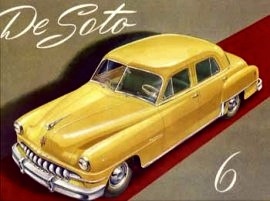 |
 |
DeSoto Custom 6 |
| |
Also see: The History of DeSoto |
| |
The Custom & De Luxe models were powered by the Powermaster 6-cylinder 250.6 cu.in. (4.1 liter) engine that delivered 116 hp at 3600 r.p.m. The Custom models were fitted with 'tip-toe transmission' (a 4-speed automatic) whereas the De Luxe models had a 3-speed manual gearbox. |
|
 |
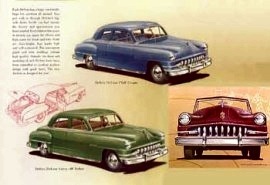 |
 |
DeSoto DeLuxe Club Coupe |
| |
Also see: The History of DeSoto |
| |
DeSoto listed the following as standard equipment: High-Compression Engine, waterproof ignition, floating power engine mountings, featherlight steering, long cradle-ride wheelbase, chair-high seats, smooth Hotchkiss drive, safety rim wheels, super cushion tires, hydraulic telescopic shock absorbers, big 12 inch hydraulic brakes, finger light parking brake and dual electric windshield wipers. |
|
 |
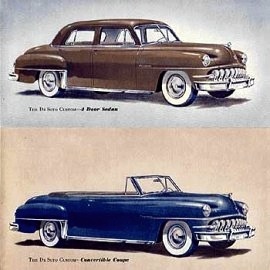 |
 |
DeSoto 4 Door Sedan and Convertible Coupe |
| |
Also see: The History of DeSoto |
| |
"Here is breathtaking proof that exciting modern design can be completely practical, for here is the most beautiful De Soto ever built ..." |
|
 |
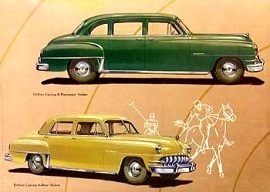 |
 |
DeSoto Custom 8 Passenger Sedan |
| |
Also see: The History of DeSoto |
| |
The DeSoto's engine was the Powermaster 6-cylinder 250.6 cu.in. (4.1 liter) unit that developed 116 hp at 3600 r.p.m. Whitewall tires were offered at extra cost. |
|
 |
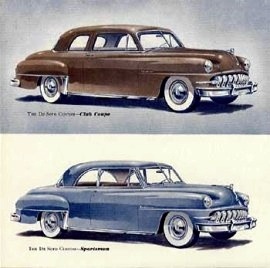 |
|
 |
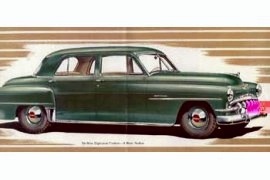 |
|
 |
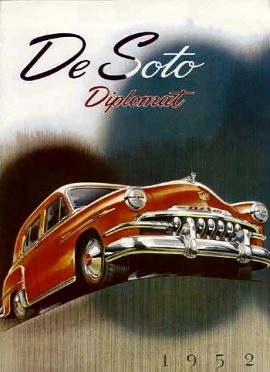 |
|
 |
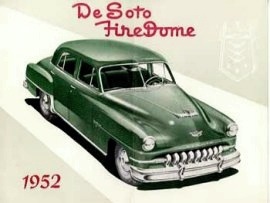 |
|
 |
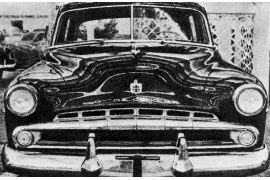 |
 |
Dodge |
| |
Also see: Dodge Car Reviews | The History of Dodge |
| |
The Dodge 1952 model range was the same as in 1951, with the exception of the Sportabout in the D-41 Wayfarer line which was discontinued (it had been introduced in 1949 as Dodge's post-war roadster). New on 1951/52 models were Oriflow shock absorbers and instrument panels with leather-grained finish to reduce glare. |
|
 |
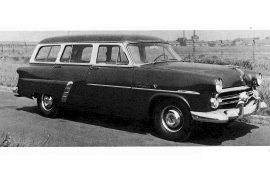 |
 |
Ford |
| |
Also see: Ford Car Reviews | The History of Ford |
| |
Ford offered three lines: Mainline, Customline and Crestline. The bodywork was restyled and now featured a one-piece windscreen. The Courier Sedan Delivery and Ranch Wagon 2-door Station Wagon were similar to the Mainline, except for the rear body. The Country Squire 4-door Station Wagon, Victoria Hardtop and Sunliner Convertible were in the Crestline series. Six-cylinder engines now had overhead valves. Pictured left is the Customline Country Sedan, Model 79B. |
|
 |
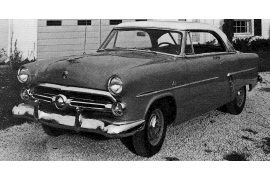 |
 |
Ford Crestline |
| |
Also see: Ford Car Reviews | The History of Ford |
| |
Ford Crestline V8 Victoria, Model 60B Sunliner was a convertible variant. These top-line models sold at US$2105 and US$2215 resp. Intermediate Customline models had the same body side mouldings. |
|
 |
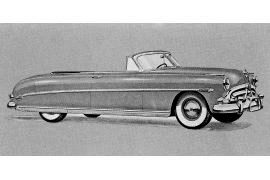 |
 |
Hudson |
| |
Also see: The History of Hudson |
| |
The Hudson 1952 B Series consisted of five model ranges: Pacemaker 4B, Wasp 5B, Commodore Six 6B. Hornet 7B and Commodore Eight 8B. Pacemakers and Wasps had a 119 inch wheelbase, while the others had a 124 inch wheelbase. All had six-cylinder engines, except the Commodore Eight, the Convertible model shown left. The Wasp was a new low-priced line. |
|
 |
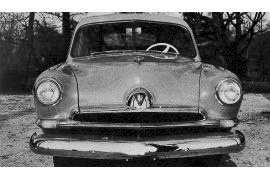 |
 |
Kaiser Henry J Corsair |
| |
Also see: Kaiser Car Reviews | The History of Kaiser |
| |
The Henry J Corsair was Kaiser-Frazer's small two-door Sedan with 100 inch wheelbase. The K523 standard model had a 4-cyl. 68-bhp 134·2 CID engine. The K524 DeLuxe had bumper overriders and a 6-cyl. 80-bhp 161 CID engine. Both power units were Willys-made L-heads. A special version, named Allstate, was launched by Sears, Roebuck & Co. It had a slightly different grille with two horizontal bars and separately mounted side lights. |
|
 |
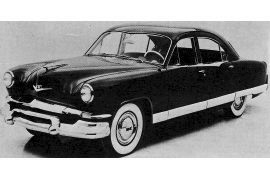 |
 |
Kaiser Manhattan |
| |
Also see: Kaiser Car Reviews | The History of Kaiser |
| |
The Kaiser Manhattan four-door Sedan was Kaiser-Frazer's top-line model. Except for a one-piece windscreen and some styling changes to the front end, the car was similar to the 1951 DeLuxe. The DeLuxe name was now employed for what used to be the Special. The higher-priced Frazer line was discontinued and the small Kaiser was sold under the Henry J marque name. |
|
 |
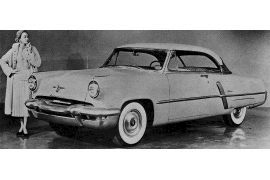 |
 |
Lincoln |
| |
Also see: Lincoln Car Reviews | The History of Lincoln |
| |
Lincoln had entirely new bodywork and showed more family resemblance to the Ford and Mercury than before. Teamed up with the 160-bhp flat-head V8 was GM's successful Hydra-Matic (the fitting of which was by no means confined to General Motors products). Pictured left is the smartly styled Capri Special Custom Hard Top Coupe. |
|
 |
 |
 |
Mercury |
| |
Also see: Mercury Car Reviews | The History of Mercury |
| |
For 1952 the Mercury MA Series had all new bodywork, and the V8 engine was uprated to 125 bhp and there were eight bodystyles: Monterey and Sport Coupes (608 and E), two-door Sedan (708), four-door Sedan and Monterey Sedan (738 and C), Monterey Convertible (768), eight- and six-passenger Station Wagons (798 and D) Conventional, overdrive and automatic transmissions were available. |
|
 |
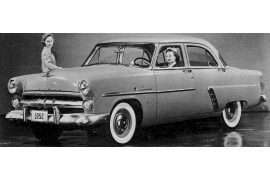 |
 |
Meteor |
| |
|
| |
Meteor Customline VS Fordor, produced by Ford of Canada. |
|
 |
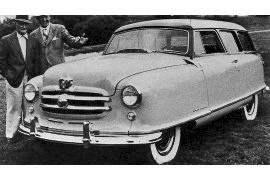 |
 |
Nash Rambler |
| |
Also see: Nash Car Reviews | The History of Nash |
| |
The Nash Rambler Custom Greenbrier Station Wagon, Model 5224, was available with two-tone paint finish. The car featured a 100 inch wheelbase and L-head Six cylinder engine. |
|
 |
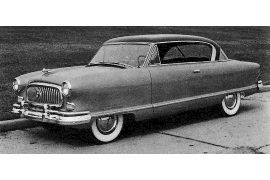 |
 |
Nash Statesman and Ambassador |
| |
Also see: Nash Car Reviews | The History of Nash |
| |
The Nash Statesman and Ambassador models featured entirely new styling with Airflyte unitary body-cum-chassis construction. The wheelbase was 114¼ and 121¼ inch respectively. Pictured left is the Ambassador Country Club Hardtop, Model 5277 . |
|
 |
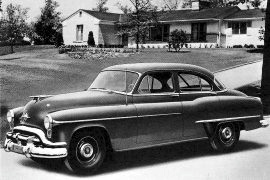 |
 |
Oldsmobile DeLuxe 88 |
| |
Also see: Oldsmobile Car Reviews | The History of Oldsmobile |
| |
The Oldsmobile DeLuxe 88 was available as either two or four-door Sedan. This lowest-priced range now had the same larger Fisher body as the Super 88 and the same 120-inch wheelbase. The Rocket V8 had a two-barrel carby and was rated at 145 bhp. |
|
 |
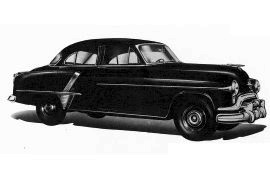 |
|
 |
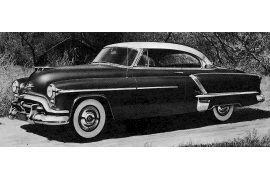 |
 |
Oldsmobile Ninety Eight |
| |
Also see: Oldsmobile Car Reviews | The History of Oldsmobile |
| |
For 1952 all Oldsmobile 98s had new body styling. Olds introduced optional power steering, dual-range Hydra-Matic Super Drive and the "Autronic-Eye", an automatic headlight dimmer. |
|
 |
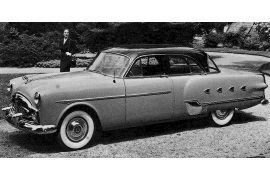 |
 |
Packard |
| |
Also see: Packard Car Reviews | The History of Packard |
| |
Packard's 25th Series Patrician 400 Sedan was the company's top-line model and featured a further refined UItramatic Drive auto transmission as standard. New Easamatic vacuum power brakes, reducing pedal pressure by 40 per cent, were an optional extra. Body styling was substantially the same as in 1951. During 1951-52 an Ambulance and a Hearse were made available in the 300 Series. |
|
 |
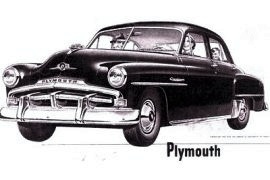 |
 |
Plymouth |
| |
Also see: Plymouth Car Reviews | The History of Plymouth |
| |
Plymouth 1952 models were carry-overs from 1951 and continued until entirely new models were introduced in October. The Cranbrook Belvedere, shown left, heading a September 1952 Chrysler Corp advertisement as Plymouth's first Hardtop. |
|
 |
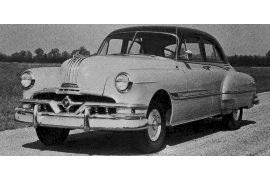 |
 |
Pontiac |
| |
Also see: Pontiac Car Reviews | The History of Pontiac |
| |
The 1952 Pontiac models looked identical to 1951 with the exception of the body side mouldings. The fastback Streamliner models were now discontinued altogether Technically, however, there were further-reaching changes, namely availability of new power trains consisting of high-compression engines and new dual-range Hydra-Matic Drive. This new transmission was an optional extra with the high-compression engines. |
|
 |
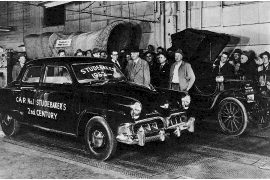 |
 |
Studebaker |
| |
Also see: Studebaker Car Reviews | The History of Studebaker |
| |
Studebaker started their second century as vehicle manufacturers with the production of the Model 12G-W5 Champion Regal Sedan at South Bend, Indiana, on 18 Feb. 1952. It was 100 years and two days after the Studebaker brothers opened their wagon-building and blacksmith shop. In its first century Studebaker turned out over seven million horse-drawn and motor vehicles. Mechanically the 1952 cars were similar to 1951. |
|
 |
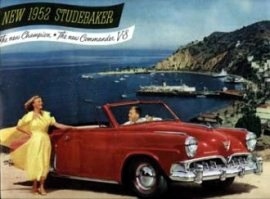 |
|
 |
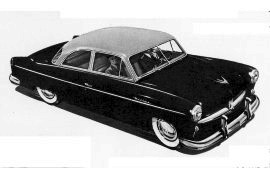 |
 |
Willys |
| |
Also see: Willys Car Reviews | The History of Willys |
| |
Willys offered their first post-war passenger cars, the Aero-Ace and the Aero-Wing. They were of compact unit-welded body/chassis construction with a new 90-bhp Hurricane F-head (inlet-over-exhaust) six-cylinder 161 CID engine. Pictured left is the Aero-Ace, which had a wider rear window and more luxurious trim than the Aero-Wing. |
|
 |
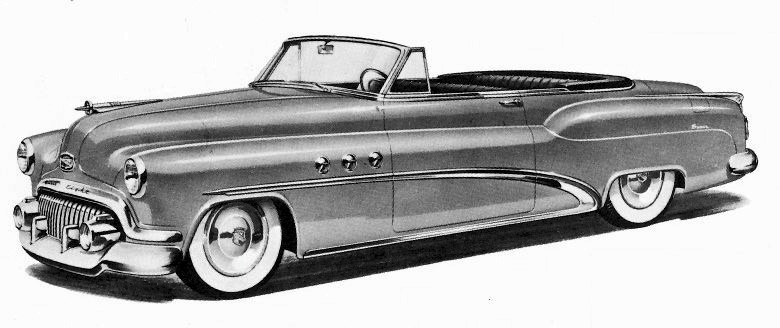 1952 Buick Series 50 Super Convertible Model 56C
1952 Buick Series 50 Super Convertible Model 56C |
|
